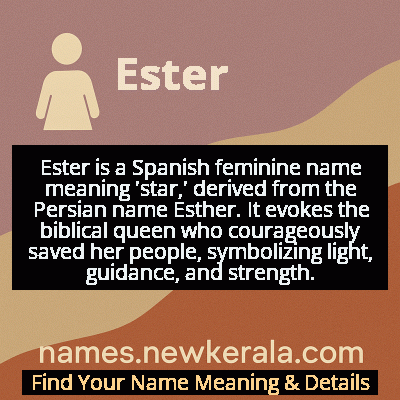Ester Name Meaning & Details
Origin, Popularity, Numerology Analysis & Name Meaning of Ester
Discover the origin, meaning, and cultural significance of the name ESTER. Delve into its historical roots and explore the lasting impact it has had on communities and traditions.
Name
Ester
Gender
Female
Origin
Spanish
Lucky Number
4
Meaning of the Name - Ester
Ester is a Spanish feminine name meaning 'star,' derived from the Persian name Esther. It evokes the biblical queen who courageously saved her people, symbolizing light, guidance, and strength.
Ester - Complete Numerology Analysis
Your Numerology Number
Based on Pythagorean Numerology System
Ruling Planet
Uranus (Rahu)
Positive Nature
Strong sense of order, loyal, practical, and disciplined.
Negative Traits
Stubborn, overly serious, rigid, and prone to feeling restricted.
Lucky Colours
Blue, gray.
Lucky Days
Saturday.
Lucky Stones
Blue sapphire.
Harmony Numbers
1, 7, 8.
Best Suited Professions
Managers, engineers, accountants, organizers.
What People Like About You
Dependability, discipline, practicality.
Famous People Named Ester
Ester Expósito
Actress
Spanish actress known for her role in Netflix series 'Elite' and rising international fame
Ester Ledecká
Professional Athlete
Czech snowboarder and alpine skier, first woman to win gold in two different sports at same Winter Olympics (2018)
Ester Dean
Singer-Songwriter
American singer, songwriter, and actress known for writing hits for Rihanna, Katy Perry, and appearing in Pitch Perfect films
Ester Toivonen
Fashion Designer
Finnish fashion designer and founder of the brand Ivana Helsinki
Name Variations & International Equivalents
Click on blue names to explore their detailed meanings. Gray names with will be available soon.
Cultural & Historical Significance
In Spanish-speaking cultures, Ester became popular through religious traditions and maintains strong connections to Catholic and Jewish heritage. The name symbolizes courage, wisdom, and divine protection across multiple cultures. During various historical periods, particularly in medieval Spain, the name served as a bridge between Jewish, Christian, and Muslim communities. In modern times, Ester represents a connection between ancient traditions and contemporary values, embodying both spiritual depth and practical strength while maintaining its cross-cultural appeal throughout Latin America and Europe.
Extended Personality Analysis
Women named Ester are often perceived as possessing a unique blend of quiet strength and compassionate intelligence. They tend to be observant and thoughtful, with an ability to assess situations carefully before acting—much like their biblical namesake who strategically planned her approach to save her people. Esters typically demonstrate remarkable resilience and inner fortitude, able to face challenges with grace under pressure while maintaining their core values and principles.
Their personality often combines practical wisdom with emotional depth, making them excellent problem-solvers and trusted confidantes. Many Esters exhibit natural leadership qualities that emerge in subtle ways, preferring to lead through inspiration and example rather than authority. They often possess strong intuition and a nurturing spirit, balanced with determination and moral courage when principles are at stake. This combination of traits makes Esters particularly effective in roles requiring diplomacy, caregiving, or strategic thinking, as they can navigate complex situations while maintaining their integrity and compassion for others.
Modern Usage & Popularity
In contemporary usage, Ester maintains steady popularity in Spanish-speaking countries while being less common in English-speaking regions where 'Esther' predominates. The name enjoys particular strength in Spain, Latin America, and Portugal, where it's considered both traditional and elegant. Recent years have seen a mild resurgence as parents seek biblical names with strong female role models that also work well in multicultural contexts. In the United States, Ester ranks outside the top 1000 names, making it a distinctive choice for parents wanting a classic name that isn't overly common. The spelling 'Ester' is particularly favored in Hispanic communities and European countries like Sweden, Finland, and Czech Republic, where it has never fallen completely out of fashion and continues to be chosen for its international appeal and historical significance.
Symbolic & Spiritual Meanings
Ester carries rich symbolic meanings derived from its dual origins and historical significance. As 'star,' it represents guidance, hope, and celestial beauty—a light in darkness that helps navigate difficult paths and inspires others. The myrtle leaf connection symbolizes love, prosperity, and immortality in various cultural traditions, particularly in Mediterranean regions where myrtle has long been associated with Venus/Aphrodite and sacred rituals. The biblical narrative adds layers of symbolism: courage in adversity, strategic wisdom, and the power of speaking truth to power even when facing grave danger. Ester embodies the concept of 'hidden royalty'—the idea that true strength and nobility may not be immediately visible but emerge when needed most, representing the potential for greatness within ordinary individuals. The name also symbolizes intercultural harmony and the ability to bridge different communities while maintaining one's identity and values.

